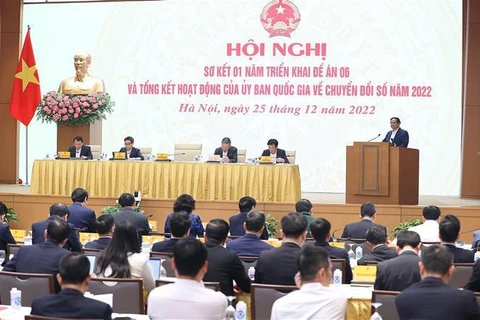 Police in Dong Tam commune conduct fingerprint collection from a local resident to make an identity card (Photo: VNA)
Police in Dong Tam commune conduct fingerprint collection from a local resident to make an identity card (Photo: VNA) Deputy Minister of Public Security Nguyen Duy Ngoc said the centre that was being studied to propose to the Government, would be “centred around people, aiming to serve people, businesses and the Government.”
He noted that this centre had been assigned to the Ministry of Public Security which has substantial experience in projects on collecting and developing national data on population as well as identity card and electronic identity verification projects.
He stressed that the ministry had a police force at four levels with strict discipline and the capacity to carry out the task that the Government assigned.
"We are in the first steps of building it and there will be many challenges and even issues that we have never dealt with, such as the legality of the centre," he said.
“This requires leaders at all levels, ministries, branches and localities to have a high political determination to be able to have the centre ready and put into use effectively,” he said, noting that while this would be the main one, member centres would also be needed and human resources would be a key factor to ensure effectiveness.
Professor, Dr. Ho Tu Bao, Director of the Data Science Laboratory of the Vietnam Institute for Advanced Study in Mathematics (VIASM), consultant of Project 06, said: “Data connectivity and data mining are at the heart of digital transformation. The source of data and connections created and exploited is the basis and engine of innovation and digital transformation, and creates a lot of opportunities for connection and sharing.”
“A right data strategy will create momentum for the development of the country,” he said.
Associate Professor, Dr. Ta Hai Tung, Rector of the School of Information and Communication Technology, Hanoi University of Science and Technology, said: "The sharing of data can bring large benefits, helping GDP growth increase from 1 to 2.5%, which means direct and indirect benefits of up to billions of US dollars.
“The connection and sharing of data allow improvements in transparency and accountability as well as create a driving force for socio-economic development,” he said.
He stressed the need to put people at the centre, calling for clear policies and implementation roadmap along with the construction of investment technology infrastructure.
Participant experts and scientists also discussed security and safety in data sharing.
The Ministry of Public Security assigned the Police Department for Administrative Management of Social Order to gather the opinions of the participants and further discuss them at an upcoming conference.
In January last year, PM Pham Minh Chinh signed Decision No. 06/QD-TTg on developing the application of data on population, identification, and electronic authentication data for national digital transformation in the 2022-2025 period, with a vision to 2030.
Under the scheme, the national population database, e-identification and e-authentication system as well as citizen ID cards with electronic chips will be used flexibly and creatively to serve administrative procedures and online public services, socio-economic expansion, digital citizens development, the completion of the ecosystem on connecting, exploiting and enriching population data, and the directions by leaders at all levels.
In the 2023-2025 period, e-identification and e-authentication are expected to be applied to all people conducting administrative procedures at one-stop-shop offices at all levels.
Meanwhile, in 2022-2023, the e-identification and e-authentication system will be upgraded, completed and applied in e-transactions serving socio-economic development./.
VNA























